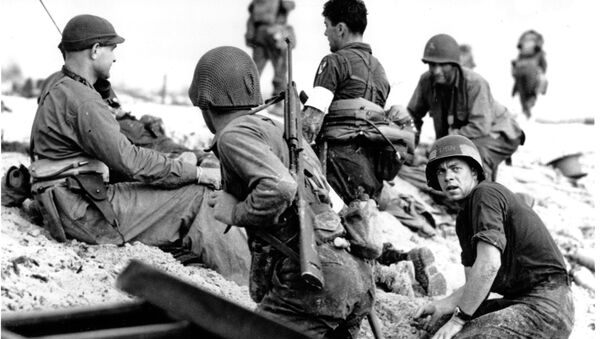Campbell knew he was in possession of the tapes for more than 10 years after finding them in the basement of a New York cabin he purchased in 1994, but he never knew exactly what was on them. At the time, Campbell had a kid on the way, and as they say, life got in the way.
It wasn’t until 2004 that Campbell managed to track someone down that had a device that could play the collection of Amertapes. And once he listened, “it was unbelievable,” he told the Washington Post.
"I'm listening to this, and I feel like I'm standing on the battleship with this guy," Campbell said, recalling the first time he listened to the tapes. "It made my hair stand up. … This is the original media and masters it was actually recorded on."
It turns out that in the collection of tapes, the Florida man had Hicks’ recording from June 6, 1944, otherwise known as D-Day.
“There we go, another plane’s coming over,” Hicks is heard saying as the sounds of gunfire ring in the background. “Right over our port side. Tracers are making an arc right over our bow now. … Looks like we're going to have a night tonight.”
“Give it to them, boys,” Hicks continues. At the time, the journalist was recording while aboard the USS Ancon, a communications ship that was stationed off the coast of Normandy, France.
A few moments later in the recording, Hicks is describes the downing of an enemy plane. “Something is burning, it’s falling through the sky … and circling down, maybe a hit plane,” Hicks says as the sounds of gunfire are heard. “They got one … they got one … smoke and flame.”
Campbell was asked later to donate the materials to the Library of Congress and even to the UK’s Imperial War Museum, but he rejected the offers and instead tried to sell the items. His attempts were not successful.
“Everybody probably thought it was fake,” he lamented to the Post. However, after the 75th anniversary of D-Day was commemorated earlier this year, Campbell decided that tapes should go to the National D-Day Memorial in Bedford, Virginia.
April Cheek-Messier, the president of the memorial’s foundation, told the outlet that the organization was “overwhelmed and delighted” over the donation, noting that while copies of Hicks’ recordings exist, “these are the originals.”
The whole trove included pieces from before, during and after D-Day and even recordings from other well known journalists such as Edward R. Murrow, according to the Post.

